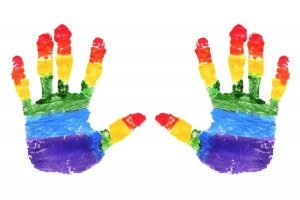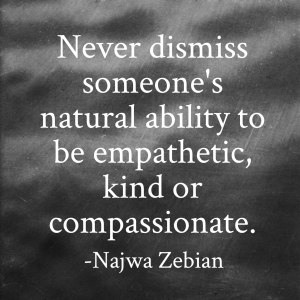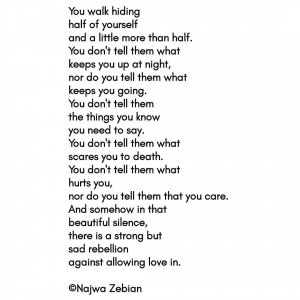Najwa Zebian's Blog
June 14, 2017
Six Boxes, One Moment
Picture this.
I am standing within the outline of a box, marked with tape on the ground. Right next to me, within my box, are educators from several schools. In the box across from me, students from another school. In the box next to them, students from another school. It goes on and on. Six boxes. Six different groups. I am the only woman with a head covering in all six groups.
The idea is for us to realize that we have more in common than we realize. We are asked to walk up to front if certain phrases apply to us. For example, those who like pineapple on their pizza.
A few prompts go by.
Now comes: If you identify as LGBT2Q+, come up to the front. A few students and staff walk up to the front.
Then comes: and those who are allies. I start walking to the front when I notice this: the seven students who had come with me, who all identify as Muslim, all walk up to the front. Every single one of them. I feel so proud.
You might think that this is the moment I’m writing about. It’s not.
When we come back to our boxes, a girl from the box facing me looks at me and once she catches my attention, she smiles, which seems in the moment, the biggest smile I had ever seen. I smiled and looked away when it hit me that it was more than that. I looked back. She smiled at me again. It was as if she made a realization. I saw change in this student’s eyes. It was an endearing moment that reminded me of the power of leading through action, not just words. This student had clearly been affected somehow, in a positive way, by my choice to walk up as an ally when Muslims are often portrayed as haters or judgmental of the LGBT2Q+ community. I saw a wall, a barrier to understanding, crumbling right before my eyes.
On my drive home, I kept telling myself that it couldn’t have been so powerful. Maybe I was just overthinking. But the power of that moment would not leave me until I found myself writing this.
May we always be open to these walls breaking and to these bridges being built.
April 26, 2017
A Lesson at 27
At 27, here is my reflection on this year:
This is a lesson I am still learning. In this world, you are just a number if you allow yourself to be. You will feel like you have no value if you accept not being treated with the value that you have. You will have no voice if you allow yourself to be silenced by the fear of your own voice roaring. You will put your whole trust in some people. And in the moment that you need their trust to be shown, they will turn their backs on you. And the heart they had when they saw you suffer becomes cold and dark. As if they have never seen you suffer. As if they didn’t see your self-worth melt right before their eyes. Their true colors spill out like venom right before your eyes. They will re-write your story as if they’re the ones who lived it. And you will be hurt. Sad. Disappointed. Your faith in humanity will break. And you will want to regret being the good person that you are. You will doubt your own sanity and wonder how the world could be so full of hypocrisy. You will wish you could be invisible and unnoticed. You will hate your own voice. And every light inside of you will want to dim as color escapes your soul little by little. But there’s a light inside of you that will refuse to burn out. It will persist. It will help you fall asleep when pain gets too painful. And it will remind you that your tears will not go unnoticed by life. That light is hope. Hope that there is always a morning after the darkness; hope that the tears you cried are cleansing your soul and purifying you. Because you cried them out of pain. And pain does not leave you if you do not feel it. If you can relate to these words, then know that this is the beginning of your transformation. If you’ve been this broken and you’re still fighting, still climbing, you are a hero. The world bringing you down is elevating you as a human. Stay strong.
– Najwa Zebian
March 17, 2017
Cultivating Empathy in Students
As I sat in a meeting with my colleagues to discuss creating a positive school culture for learning, we all enriched the discussion by sharing our stories and experiences. By the end, it seemed that we were all coming back to the same point; empathy.
So I started reflecting; are we born with empathy? Or is it something that we need to develop? And, if we are born with empathy, what happens over the years? How do we lose it? Why do some people seem to be naturally empathetic, while others have to put in the extra effort to really understand what someone else is going through? If I could answer these questions, I would be able to assess and decipher what our role as educators is when it comes to empathy. Do we teach it from scratch? Do we nourish it? Do we open opportunities in class for it to be shared? What do we really do?
Let’s take a moment here while I reflect on my own self. I have struggled my whole life with being too emotionally invested in anything. Yes, anything that spurs any kind of emotion. Instead of having to actively remind myself to be empathetic, I have been taught by my environment to always be conscious of not being too empathetic. It wasn’t until the last few years of my life that I’ve learnt to cherish this attribute within me. It didn’t happen over night. There were many turning points along the way, such as the one I am about to describe.
I think back to this memory with one of the Syrian newcomers that I had the honour of working with, which I wrote about in a past post:
As we work on making cubes with the 6 universal emotions on all six sides, my high school students and I are talking about the importance of expressing ourselves and our emotions. One of my students looks at a his peer’s cube and, with the biggest smile on his face, says: “that’s so colorful! Did you dip it into a paint can or something?!” My group of about 10 students bursts into laughter. The volunteer in my classroom turns to this student and says: “you are so funny!” I, at this point, am just translating back and forth. He says: “Is that a good thing?”. She says: “Of course! You always make this environment so happy!” He turns to me and says: “I never used to be like this, but one day, my cousin told me, when you die, what will you take with you? Not the sadness. Not the misery. You will only take the happiness and goodness that you spread.” At this point, I am so proud and shocked with the level of maturity that this teen demonstrated.
“Then my cousin died,” he said.
Now tell me, dear person reading this, how would you react in this kind of situation? Do you ask questions? Do you worry about the rest of the students in the class listening to this? Do you change the topic? Do you ignore what you just heard this?… What do you do?
I decided to take off that armor that I had on and to allow my vulnerability to do its work at this point. If this student opened up the topic, that means he already trusted me with it. So, little by little, he unpacked his story right before me, and I could see it so clearly as he described it in the gravest possible detail. It got worse. I resisted stopping him from talking many, many times.
It was difficult to listen to. It was difficult to take it all in. But, if it was difficult for me to listen to, how difficult was it for him to go through it, and talk about it?
That was one of the defining moments of my teaching career, because when I went home, I reflected deeply on my role as a teacher. I couldn’t stop the human in me from affecting the teacher in me. My role is to ensure a safe learning environment and that sometimes could lead to wanting to shelter students from the pain of the world. But how could the pain go away if it is not acknowledged? Perhaps my role is not just to create a safe learning environment, but also a resilient one. An empowering one. That’s when I realized that both the human and the teacher in me are one. You cannot be one without the other.
So on this recent journey to research whether empathy is inborn or developed over the years, surely enough, I discovered that it is inborn, but must be nurtured over the years. Nurturing it begins with acknowledging its presence in the first place. What does that really mean? It means that we must be more attentive to the natural ways in which our children demonstrate empathy, kindness and compassion. And we must reward these demonstrations. A reward could be as simple as saying: “thank you for your kindness”. Never dismiss someone’s natural ability to be empathetic, kind or compassionate. Overtime, such dismissal can silence and deafen this natural gift that we are all born with.
Now you might be wondering why I chose the term “cultivate” to put before “empathy”. It’s simple. Cultivating means fostering the growth of something. In other words, we are acknowledging that empathy already exists within us. All we need to do is create the proper conditions for it to be active and alive. When we plan our lessons, we are told to start with students’ prior knowledge. This should also apply to how we educate the humans in our students. We need to start with what they already have, and with what they know about what they already have. That is how we set them up for success. That is how we strengthen their strengths and empower them to have the courage to be the humans that they already are. More importantly, we should never assume that students know how they should act or react, because we don’t know what their home and social environments have conditioned them to believe. When we assume, we are more likely to judge. And when we judge, we are more likely to give negative consequences to students when they genuinely might not know any better. When we have a certain standard, we might miss a simple gesture of empathy on behalf of a student. We must therefore be attentive and not shy away from acknowledging these gestures as simple as they may be.
So what does empathy look like and sound like?
The definition of empathy, as described by Brené Brown, prominent researcher in the field of shame and vulnerability is:
To be able to see the world as others see it.
To be nonjudgmental.
To understand another person’s feelings.
To communicate your understanding of that person’s feelings.
(Based on nursing scholar Theresa Wiseman’s four attributes of empathy. Source: Psychology Today)
Based on this, how will you put the empathy that already exists within you to cultivate, to foster the growth of, empathy in your students? Will you allow the human in you to enrich the teacher in you?
– Najwa
March 11, 2017
You Are Not My Oppressor
I wrote this for he who shall not be named:
You are not my oppressor.
You are not my ruler.
If speaking the truth makes me a tyrant,
Then let me be a tyrant.
If resisting your executive orders makes me a rebel,
Then I wish to revolt.
I wish to defy.
I wish to say NO.
If standing in the way of your pipelines makes me an outlaw,
Then put your pipeline right through me
Because I will not
Move out of your way.
And if you build a wall in my face,
I will climb it.
Let it reach the seventh sky,
I will shatter it.
Brick. By. Brick.
And it. Will. Crumble.
Just like your ego that is hanging by a thread,
Your wall is built on sand that is quicker than the hail of a storm.
And if you turn me away because of my
Color, because of my
Beliefs, or my identity.
Then turn me away.
But don’t you for a second think that
Pushing me away clears your slate.
If you push me away because I am seeking peace
And safety,
Then you have taken part in killing me.
Does it surprise you that a woman like me is speaking to you the way that I am?
Let me remind you that what’s wrapped around my head
Is not wrapped around my mouth.
So I will not allow the label that you wrap me with
To wrap around my voice.
If the truth hurts you,
That’s your problem.
You may ignore it, but
Don’t you dare change it to “alternative facts”.
The voice of justice will remain
Louder
Than corruption.
Your corruption, sir, has turned us into
Corruptors.
Your oppression, sir,
Has changed us into oppressors.
But your coldness,
Has ignited the warmth of humanity with us.
So… as a human, I remind you
That strength does not come from gaining power and control.
Strength does not come from building walls
Or hiding behind forts and bans.
Strength comes from being
Human.
And as a woman, I tell you:
Take your eyes off of my body.
That’s not where my glory lies.
Stop telling me that my heart makes me weak.
My heart makes the world beat.
Stop telling me that
“boys will be boys” and that it is my fault
If you cannot control yourself around me.
I do not accept less than
“Humans will be humans”.
-Najwa Zebian
February 2, 2017
Bend, but do not break.
Bend, but do not break.
Fall, but do not stay on the ground.
Feel the pain, but do not stay in pain.
Be sad, but do not make sadness your home.
When the weight is too heavy, build the strength to carry it.
When the fall is too deep, build the courage to get back up.
When the pain is too painful, feel it and walk it out of you.
When sadness overwhelms you, remember that the deeper that sadness digs into your soul, the more happiness your soul is able to contain.
Stand strong in the face of your struggles.
Do not give up.
Do not give in.
What drags you down is only beneath you.
Remember that.
– Najwa
December 3, 2016
October 18, 2016
Opposites
You seek pain as if
it’s going to save you.
You dip into sadness
as if it’s going to bring you joy.
You expect that loving
the night will make
your days better,
and that loving the rain
will make the sun shine brighter.
You expect that diving
into the ocean
will get you to the shore of sanity faster.
Perhaps we live life in opposites.
To feel one thing,
we seek the other.
And to become a masterpiece,
we deliberately seek
what makes us fall and crumble,
to create a self so delicately stitched together,
it cannot be compared to another.
– Najwa
October 10, 2016
Too Sensitive?
Many will try to convince you that your sensitivity makes you weak. Let me tell you that your sensitivity makes you beautiful. Your sensitivity makes you different. It makes you unique. You see, we live in a world where it’s easier to pretend that you don’t feel, and if you dare express that you feel, you become an easy target to be picked on and hurt. So, from a young age, you’re taught that strength means hiding how you feel, or not expressing your feelings at all. I want you to ask yourself, if you don’t feel, how can you truly love? If you don’t feel, how can you empathize with the tragedies happening in the world? If you are sensitive to being disrespected, it means that you will not disrespect others because you know how it feels to be disrespected. If you are sensitive to being ignored or lied to, you will not ignore or lie to others because you know how it feels to be ignored and lied to. Promise yourself from today to be at peace with your sensitivity. Instead of trying to hide it, cherish it.
– Najwa
October 8, 2016
Walk Away a Champion
Sometimes we love the wrong person so we can realize how much love we are capable of giving. They need love and we have the ability to give it. So we are allowed the opportunity to give it. But we take their inability to love us with the same intensity as a sign that something about us is hard to love. We call the whole experience a mistake because we gave more than what we received in return. We regret giving so much of ourselves because we were left in pain wondering why what we gave was not valued or appreciated. Just remember this: the love that you give never goes to waste. And if you were able to love the wrong person so much, imagine how much you’re going to love the right person. Just know when to walk away. When giving them love is hurting your love for yourself, don’t think for one moment that walking away is the wrong decision. You are not giving up on them by walking away, but if you stay, you might be giving up on yourself.
– Najwa







